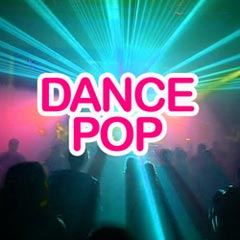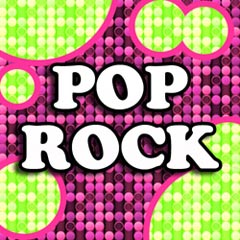Electro pop
ON AIR - PROGRAMMING
Commercial and pop rhythms, simple and soft electronic sounds, warm lyrics that are conceptually criticizing the contemporary society. A kind of irony on one's condition of artist and pop icon, while the lyrics reflect delicacy, detachment and a hidden inner conflict. Electropop means synthetizing one's life and affections, leaving them aside and trying to see them from an external point of view. In this playlist, you'll find the best electropop songs. Electro pop songs flood the airwaves, signalling a new era of sonic exploration. They reach for the stars and dare to challenge the state of the music industry, pushing boundaries and norms. A mashup of diverse sonorities, these tunes invoke an ebullient mood that aims to electrify both artist and audience alike. Twangy beats, cheerful keys, and eclectic generations all come together under one label: Electro Pop. Expect danceable production with plenty of energy-- all wrapped up in something that sounds as unique as it is enjoyable. A playlist with the best songs of electropop and synth pop
Get Electrified with These Electropop Songs
In today's fast-paced and ever-changing music industry, electro pop has taken over the airwaves. This genre has a unique way of synthesizing one's emotions and experiences and presenting them in a way that is both soft and delicate but also critical of today's society. Electropop is a genre that challenges the way we think about music and invites us to experience a new kind of sonic exploration. In this article, we will introduce you to some of the best electropop songs that will leave you feeling electrified, energized, and eager to dance.
First on our list is Got My Number by Kim Petras, a unique track featuring upbeat production and a catchy chorus. Kim's vocals are reminiscent of early pop icons such as Madonna and Britney Spears, with a modern twist that makes her stand out from the crowd. Got My Number features clever lyrics that are relatable and fun to sing along to. This song is perfect for a night out with friends or a solo dance party in your room.
Next up, we have Passion by HUNNY, an electropop track that features HUNNY's signature blend of guitar riffs and electronic beats. This tune will transport you to a world of nostalgia, with lyrics that speak to the inner conflict many of us face when dealing with love and relationships. The driving beat and catchy melody make this song perfect for any occasion when you want to dance your cares away.
Third on our list is Overthinking by Sasha Sloan, a song that will hit you right in the feels. This electropop ballad features soft electronic sounds and soulful vocals that will tug at your heartstrings. Sasha's lyrics are deeply personal, as she deals with the pain of overthinking and the uncertainty of love. This song is perfect for those moments when you need to reflect and connect with your emotions.
Fourth on our list is Babygirl by Kiiara, a bouncy electropop track that will make you want to get up and dance. Kiiara's vocals are light and airy, perfectly complementing the upbeat production. Babygirl features lyrics that are a reflection on the modern obsession with followers, likes, and social media. This song is perfect for those who want to feel good and forget about the troubles of the world.
The final song on our list is Lose You by Andrew McMahon in the Wilderness, a song that features a more stripped-down and emotional sound than the previous tracks. This song is a reflection on the pain of losing someone you love and the struggle to move forward. Andrew's vocals are raw and heartfelt, perfectly capturing the emotions of loss and grief. This song is perfect for those moments when you need to feel a connection to something beyond yourself.
Electropop is a genre that has taken the music industry by storm, offering a unique blend of simple yet critical lyrics and upbeat electronic production. In this article, we have introduced you to some of the best electropop songs out there today, featuring catchy melodies, creative lyrics, and danceable beats. Whether you are in the mood for something bouncy and upbeat or a more emotional ballad, these tracks are sure to electrify your playlist and leave you feeling energized and inspired.
Electropop is a genre that has taken the music industry by storm, offering a unique blend of simple yet critical lyrics and upbeat electronic production. In this article, we have introduced you to some of the best electropop songs out there today, featuring catchy melodies, creative lyrics, and danceable beats. Whether you are in the mood for something bouncy and upbeat or a more emotional ballad, these tracks are sure to electrify your playlist and leave you feeling energized and inspired.
Get Electrified with These Electropop Songs
In today's fast-paced and ever-changing music industry, electro pop has taken over the airwaves. This genre has a unique way of synthesizing one's emotions and experiences and presenting them in a way that is both soft and delicate but also critical of today's society. Electropop is a genre that challenges the way we think about music and invites us to experience a new kind of sonic exploration. In this article, we will introduce you to some of the best electropop songs that will leave you feeling electrified, energized, and eager to dance.
First on our list is Got My Number by Kim Petras, a unique track featuring upbeat production and a catchy chorus. Kim's vocals are reminiscent of early pop icons such as Madonna and Britney Spears, with a modern twist that makes her stand out from the crowd. Got My Number features clever lyrics that are relatable and fun to sing along to. This song is perfect for a night out with friends or a solo dance party in your room.
Next up, we have Passion by HUNNY, an electropop track that features HUNNY's signature blend of guitar riffs and electronic beats. This tune will transport you to a world of nostalgia, with lyrics that speak to the inner conflict many of us face when dealing with love and relationships. The driving beat and catchy melody make this song perfect for any occasion when you want to dance your cares away.
Third on our list is Overthinking by Sasha Sloan, a song that will hit you right in the feels. This electropop ballad features soft electronic sounds and soulful vocals that will tug at your heartstrings. Sasha's lyrics are deeply personal, as she deals with the pain of overthinking and the uncertainty of love. This song is perfect for those moments when you need to reflect and connect with your emotions.
Fourth on our list is Babygirl by Kiiara, a bouncy electropop track that will make you want to get up and dance. Kiiara's vocals are light and airy, perfectly complementing the upbeat production. Babygirl features lyrics that are a reflection on the modern obsession with followers, likes, and social media. This song is perfect for those who want to feel good and forget about the troubles of the world.
The final song on our list is Lose You by Andrew McMahon in the Wilderness, a song that features a more stripped-down and emotional sound than the previous tracks. This song is a reflection on the pain of losing someone you love and the struggle to move forward. Andrew's vocals are raw and heartfelt, perfectly capturing the emotions of loss and grief. This song is perfect for those moments when you need to feel a connection to something beyond yourself.
Electropop is a genre that has taken the music industry by storm, offering a unique blend of simple yet critical lyrics and upbeat electronic production. In this article, we have introduced you to some of the best electropop songs out there today, featuring catchy melodies, creative lyrics, and danceable beats. Whether you are in the mood for something bouncy and upbeat or a more emotional ballad, these tracks are sure to electrify your playlist and leave you feeling energized and inspired.
Electropop is a genre that has taken the music industry by storm, offering a unique blend of simple yet critical lyrics and upbeat electronic production. In this article, we have introduced you to some of the best electropop songs out there today, featuring catchy melodies, creative lyrics, and danceable beats. Whether you are in the mood for something bouncy and upbeat or a more emotional ballad, these tracks are sure to electrify your playlist and leave you feeling energized and inspired.
2023-02-26
A new great electro pop artist, Sarah P.
Today we interview a young artist from Greece who represent a new way of interpreting electro pop. We love the fierce strength of her lyrics, the feminine power of her personality and the fluent and direct messages and critics that we find in her songs.
1. Would you define your genre as minimal synth pop? Do you consider it the genre that will lead the way in 2019?
That’s one way to describe it. I don’t think that it’s easy to classify my music, because I’m writing in a very intuitive way. My songs end up sounding too edgy for pop lovers, too soft for people into rock music, too organic for the ones into electro. As for the second part of your question… I don’t think so, but I hope so!
2. It’s amazing that in your lyrics and your music you are able to express complex concepts with ease and comfort. How did you choose this way of composing?
Thank you so much. It’s very natural for me. I have hard times doing anything else, but that! I’m not forcing any topics or lingering on melodies until I make them work. Usually, I complete a song in a day and after that, it’s all about fine-tuning. If an idea doesn’t become a song, I save it on my computer, but I rarely go back to rework it. Every time I like to create music from scratch - like painting on a blank canvas.
3. What inspires you the most when you create?
It used to be past experiences, but now it’s more my surroundings and the news, the everyday life, the mundane. It’s a very interesting world we live in - very unpredictable. We need more songs inspired by current affairs to remind us of our situation and to guide us through darker times. I find the music scene lacking responsibility. We’re given a platform and we should use it in a conscious way.
4. The name of your former band, Keep Shelley in Athens, aside from being a pun, it actually does quote the Shelleys. How does their poetry influence your work? The maenad in P.B.’s famous Ode and Cybele in the translated Homeric hymn, the search for identity in Mary’s work, which forces do they represent in your lyrics?
I can reassure you that the name of the band was not inspired by the Shelleys - it was only meant to be referencing the urban Athenian neighbourhood Kypseli. However, I happen to be a big Mary Shelley fan. I find exciting both her work, as well as her life. And indeed, the search for identity is a recurring theme in my work. While it’s not happening consciously, I guess, like every other creator, I draw inspiration from artists, poets, and writers that I admire. The Shelleys lived in a truly interesting time where the social structures were already challenged from the inside, no matter what happened next. This gave room for the arts and the social sciences to bloom and grace us with masterpieces and new knowledge. Romanticism was inspired by the power of emotions - let that be love or fear. This is definitely something I’m inspired by, too.
5. Starting from Who I am and Free, the inner dialogue and memory seem to be underlying all your records. With Lotus Eaters and Mneme, for instance, you weave a thread made of feelings, ancient and modernist literature, memory and oblivion. How do you feel being the continuity of what you were in an ancient past and what you sing now? How does the Greek culture influence your music and your lyrics in general?
I reconnected with Ancient Greek mythology in the past one and a half year. I find mythology to be very didactic and one has to be ready for its messages and lessons. If you think about it, no matter how far humanity has progressed technologically since mythology was conceived, morally and intellectually, we’re pretty much at the same levels. Surely there have been times where societies were blooming - some years later for them to be brought down by wars and other disasters. As if we’re able to develop so far, then having to start again from zero. In Greece’s modern history (from the late modern period up to today), there’s only been one winner: Greek people’s pride. That’s become our culture. We’re telling ourselves that we’ll survive no matter what. Yes, we do mistakes, yes, we’re stubborn. But we fight until the end for the hope of a better future. Even if I tried to not be influenced by this I can’t; it’s a state of mind for every Greek.
6. With the song Millennial Girl, you criticize the stereotypes of the young girl. In this contemporary world, how does a girl break with such stereotypes?
I just want to say - I don’t criticize, I’m commenting on it. I can’t criticize it because I’m part of this. I’ve also been a victim of thoughts like “I have to be thinner”, “I wish I looked better”, “I wish I looked like her”. I’m afraid for my generation - perhaps even for generation Z, the game is lost. Superficiality is part of modern culture and it’s inescapable. Eventually, things will change - we’re heading somewhere in high speed, we just don’t know where. Maybe the younger generations will achieve this much-needed change that should be connected with a massive societal slowdown and a simpler life.
For the girls of today, all we’ve got is female empowerment. We must ensure their education, encourage them to believe in themselves and help them realize their worth. The sooner that happens, the closer we’ll be to a positive change.
7. What do you think about people’s dependence on technology?
We’re too attached - it’s become unhealthy. Our constantly increasing dependence on technology leads to overconsumption. We’re consuming in a reckless way - that’s, of course, impacting our well-being, as well as our societies and the environment. We have to slow down for the sake of our planet and the generations to come.
8. We are longing to know something more about the next steps in your artistic journey. Could you give us a hint?
Maenads serves as a prelude for my upcoming full-length that’s called Plotting Revolutions - it’s the calm before the storm. On Plotting Revolutions, I’ll be addressing topics such as our dependence on technology that we talked about, youth unemployment and debt, as well as touching on the elite theory and power politics.
To see the artist’s page, go here.
1. Would you define your genre as minimal synth pop? Do you consider it the genre that will lead the way in 2019?
That’s one way to describe it. I don’t think that it’s easy to classify my music, because I’m writing in a very intuitive way. My songs end up sounding too edgy for pop lovers, too soft for people into rock music, too organic for the ones into electro. As for the second part of your question… I don’t think so, but I hope so!
2. It’s amazing that in your lyrics and your music you are able to express complex concepts with ease and comfort. How did you choose this way of composing?
Thank you so much. It’s very natural for me. I have hard times doing anything else, but that! I’m not forcing any topics or lingering on melodies until I make them work. Usually, I complete a song in a day and after that, it’s all about fine-tuning. If an idea doesn’t become a song, I save it on my computer, but I rarely go back to rework it. Every time I like to create music from scratch - like painting on a blank canvas.
3. What inspires you the most when you create?
It used to be past experiences, but now it’s more my surroundings and the news, the everyday life, the mundane. It’s a very interesting world we live in - very unpredictable. We need more songs inspired by current affairs to remind us of our situation and to guide us through darker times. I find the music scene lacking responsibility. We’re given a platform and we should use it in a conscious way.
4. The name of your former band, Keep Shelley in Athens, aside from being a pun, it actually does quote the Shelleys. How does their poetry influence your work? The maenad in P.B.’s famous Ode and Cybele in the translated Homeric hymn, the search for identity in Mary’s work, which forces do they represent in your lyrics?
I can reassure you that the name of the band was not inspired by the Shelleys - it was only meant to be referencing the urban Athenian neighbourhood Kypseli. However, I happen to be a big Mary Shelley fan. I find exciting both her work, as well as her life. And indeed, the search for identity is a recurring theme in my work. While it’s not happening consciously, I guess, like every other creator, I draw inspiration from artists, poets, and writers that I admire. The Shelleys lived in a truly interesting time where the social structures were already challenged from the inside, no matter what happened next. This gave room for the arts and the social sciences to bloom and grace us with masterpieces and new knowledge. Romanticism was inspired by the power of emotions - let that be love or fear. This is definitely something I’m inspired by, too.
5. Starting from Who I am and Free, the inner dialogue and memory seem to be underlying all your records. With Lotus Eaters and Mneme, for instance, you weave a thread made of feelings, ancient and modernist literature, memory and oblivion. How do you feel being the continuity of what you were in an ancient past and what you sing now? How does the Greek culture influence your music and your lyrics in general?
I reconnected with Ancient Greek mythology in the past one and a half year. I find mythology to be very didactic and one has to be ready for its messages and lessons. If you think about it, no matter how far humanity has progressed technologically since mythology was conceived, morally and intellectually, we’re pretty much at the same levels. Surely there have been times where societies were blooming - some years later for them to be brought down by wars and other disasters. As if we’re able to develop so far, then having to start again from zero. In Greece’s modern history (from the late modern period up to today), there’s only been one winner: Greek people’s pride. That’s become our culture. We’re telling ourselves that we’ll survive no matter what. Yes, we do mistakes, yes, we’re stubborn. But we fight until the end for the hope of a better future. Even if I tried to not be influenced by this I can’t; it’s a state of mind for every Greek.
6. With the song Millennial Girl, you criticize the stereotypes of the young girl. In this contemporary world, how does a girl break with such stereotypes?
I just want to say - I don’t criticize, I’m commenting on it. I can’t criticize it because I’m part of this. I’ve also been a victim of thoughts like “I have to be thinner”, “I wish I looked better”, “I wish I looked like her”. I’m afraid for my generation - perhaps even for generation Z, the game is lost. Superficiality is part of modern culture and it’s inescapable. Eventually, things will change - we’re heading somewhere in high speed, we just don’t know where. Maybe the younger generations will achieve this much-needed change that should be connected with a massive societal slowdown and a simpler life.
For the girls of today, all we’ve got is female empowerment. We must ensure their education, encourage them to believe in themselves and help them realize their worth. The sooner that happens, the closer we’ll be to a positive change.
7. What do you think about people’s dependence on technology?
We’re too attached - it’s become unhealthy. Our constantly increasing dependence on technology leads to overconsumption. We’re consuming in a reckless way - that’s, of course, impacting our well-being, as well as our societies and the environment. We have to slow down for the sake of our planet and the generations to come.
8. We are longing to know something more about the next steps in your artistic journey. Could you give us a hint?
Maenads serves as a prelude for my upcoming full-length that’s called Plotting Revolutions - it’s the calm before the storm. On Plotting Revolutions, I’ll be addressing topics such as our dependence on technology that we talked about, youth unemployment and debt, as well as touching on the elite theory and power politics.
To see the artist’s page, go here.
Tag: electro pop, hipster, synth, interview, femenine power
What are you thinking about?






